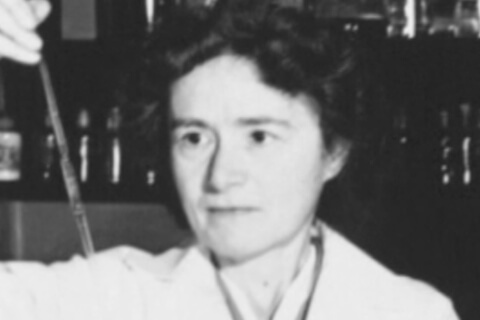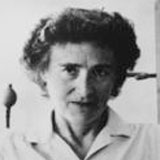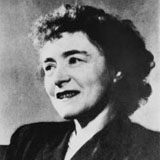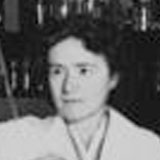Biography: Dr. Gerty Theresa Radnitz Cori

Year: 1947
Achievement: Dr. Gerty Cori was the first woman in America to receive a Nobel Prize in science.
Gerty Theresa Radnitz Cori and her husband, Dr. Carl Cori, were the first married couple to receive a Nobel Prize in science. Gerty Cori was only the third woman ever to win a Nobel Prize, and was the first woman in America to do so.
Gerty Cori was born in Prague, Czechoslovakia in 1896, to Otto Radnitz and Martha Neustadt. Her uncle, a professor of pediatrics, encouraged her to attend medical school, and she was admitted to the German University of Prague, where there were only a few female students. She graduated with her M.D. degree in 1920, along with her classmate Carl Cori. They married soon after graduation, and were hired to work in clinics in Vienna. Realizing that Europe was heading for war, they began applying for work overseas. In 1922, they moved to Buffalo, New York, where Carl took a position at the State Institute for the Study of Malignant Diseases (later the Roswell Park Memorial Institute), and Gerty Cori was hired as an assistant pathologist. While at Roswell they were discouraged from working together, but did so anyway, devoting their efforts to how energy is produced and transmitted in the human body. Specializing in biochemistry, they began studying how sugar (glucose) is metabolized.
The Coris published fifty papers jointly while at Roswell, with either researcher's name appearing first, depending on who had done the bulk of the research for a given paper. Gerty Cori also published eleven articles as single author. In 1929, they proposed the theory that bears their name and later won them a Nobel Prize. The "Cori cycle" is their explanation for the movement of energy in the body—from muscle, to the liver, and back to muscle. Glycogen in muscles is converted to sugar (glucose) when energy is needed to fund physical activity, but the muscles leave some of the sugar as lactic acid, for later use. The lactic acid is recycled into glycogen by the liver, which is then stored in the muscles until needed. Their discovery of this process was especially useful for the treatment of diabetes, but it was also the first time the cycle of carbohydrates in the human body had been fully understood and explained.
The Coris decided to leave Roswell soon after publishing their work on carbohydrate metabolism, mainly because Roswell's primary focus was cancer research. But though they had developed the Cori cycle together, Carl Cori was the one to receive job offers at universities. Although faculty at the University of Rochester warned Gerty Cori that she might ruin her husband's career, the couple refused to stop working together. Both Cornell University and the University of Toronto refused to hire Gerty Cori even while they tried to persuade her husband to take up an appointment, so the couple moved to St. Louis in 1931, where Carl had been offered the chair of the pharmacology department at Washington University School of Medicine. Gerty Cori was offered a position as a research assistant, despite her partnership role in the discovery of the Cori cycle.
Gerty Cori worked as a research associate for sixteen years while her husband and colleague, Carl Cori, rose through the ranks at Washington University School of Medicine. When Carl Cori was made chair of the new biochemistry department in 1946, Gerty Cori was promoted to full professor, and the following year both the Coris won the Nobel Prize for discovering the enzymes that convert glycogen to sugar and back again into glycogen.
Continuing their earlier research, the Coris made a number of important discoveries clarifying the process of carbohydrate metabolism. They received numerous awards for their isolation and discovery of the compound glucose-1 phosphate (later called the Cori ester), and for their demonstration of the role of lactic acid in the conversion of glucose to muscle glycogen (known as the Cori cycle).

Asterix Dr. Gerty Theresa Radnitz Cori
Asterix Dr. Gerty Theresa Radnitz Cori
Dr. Gerty Radnitz Cori was the first American woman to receive the Nobel Prize in Medicine. She and her husband, Dr. Carl Cori, shared the prize for their discovery of the cycle of carbohydrates in the human body. They had been classmates at the German University of Prague, where Gerty Cori was one of only a few women students. She received her M.D. in 1920. The couple married and began to work in clinics in Vienna. In 1922, concerned that war would break out in Europe for a second time, they immigrated to Buffalo, New York. Carl Cori accepted a position at the State Institute for the Study of Malignant Diseases. Gerty Cori joined him six months later, after securing a job as an Assistant Pathologist. Although the couple was frequently discouraged from working together, they had a dynamic research partnership that proved immensely profitable in their work. Specializing in biochemistry, the husband and wife team began to study how glucose is metabolized in the human body. In 1929, they developed their theory of 'the cycle of carbohydrates,' now known as the Cori Cycle. The theory explains how carbohydrates supply energy to muscles during exercise, and then are regenerated and stored until needed again by the muscles. It was the first time the cycle of carbohydrates in the human body had been fully explained and understood, and proved especially useful for the treatment of diabetes. Despite their collaborative partnership in defining the cycle, Carl Cori initially received more professional recognition than Gerty Cori. He was encouraged to abandon the team approach and work alone. He was even offered a job only on the provision that he stop working with his wife. The Cori's continued in their successful collaboration, however, and in 1931 moved to St. Louis. Carl Cori took up the post of Chair of the Pharmacology Department at Washington University School of Medicine. Over the next sixteen years, Gerty Cori worked alongside him as a research assistant. Together, they made further discoveries that clarified the processes of carbohydrate metabolism, that they had originally laid out in the description of the Cori Cycle. In the mid-1940s, Carl and Gerty Cori received great recognition for their work. Carl Cori was appointed Chair of the new Biochemistry Department in 1946, and Gerty Cori was appointed to a full professorship. The following year, they were awarded the Nobel Prize for the Cori Cycle. They were the first married couple ever to win the Nobel Prize in Medicine.






